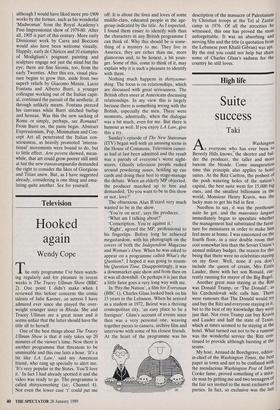Television
Hooked again
Wendy Cope
The only programme I've been watch- ing regularly and for pleasure in recent weeks is The Tracey Ullman Show (BBC 2). One point I didn't make when I reviewed this before concerns the comic talents of Julie Kavner, an actress I have admired ever since she played the over- weight younger sister in Rhoda. She and Tracey Ullman are a great team and it seems unfair that the latter should have the title all to herself.
One of the best things about The Tracey Ullman Show is that it only takes up 20 minutes of the viewer's time. Now there is another programme that threatens to be unmissable and this one lasts a hour. 'It's a bit like LA Law,' said my American friend, who rang up specially to alert me. `It's very popular in the States. You'll love it.' In fact I had already spotted it and the video was ready to go. The programme is called thirtysomething (sic, Channel 4). Not even the lower case 't' could put me
off. It is about the lives and loves of some middle-class, educated people in the age- group indicated by the title. As I expected, I found them easier to identify with than the characters in any British programme I can think of. Why this should be is some- thing of a mystery to me. They live in America, they are richer than me, more glamorous and, to be honest, a bit youn- ger. Some of this, come to think of it, may explain why it is such a pleasure to identify with them.
Nothing much happens in thirtysome- thing. The focus is on relationships, which are discussed with great seriousness. The British often sneer at Americans discussing relationships. In my view this is largely because there is something wrong with the British, especially the men. There were moments, admittedly, when the dialogue was a bit much, even for me. But there is humour as well. If you enjoy LA Law, give this a try.
Sunday's episode of The New Statesman (ITV) began well with an amusing scene in the House of Commons. Television camer- as had at last been admitted and the result was a parody of everyone's worst night- mares. Ghastly television people rushed around powdering noses, holding up cue cards and doing their best to stage-manage the debate. When an elderly MP objected, the producer marched up to him and demanded, `Do you want to be in this show or not, love?'
The obnoxious Alan B'stard very much wanted to be in the show.
`You're on next', says the producer. `What am I talking about?'
`Conscription. You're against it.'
`Right', agreed the MP, professional to his fingertips. Before long he achieved megastardom, with his photograph on the covers of both the Independent Magazine and Woman's Own. When he was asked to appear on a programme called What's the Question?, I hoped it was going to resem- ble Question Time. Disappointingly, it was a downmarket quiz show and from then on it was all downhill. Or perhaps it is just that a little farce goes a very long way with me.
In 'Pity the Nation', a film for Everyman (BBC 1), Charles Glass looked back on his 15 years in the Lebanon. When he arrived as a student in 1972, Beirut was a thriving cosmopolitan city, 'an easy place to be a foreigner'. Glass's account of events since then was a very personal one, weaving together pieces to camera, archive film and interviews with some of his closest friends. At the heart of the programme was his description of the massacre of Palestinians by Christian troops at the Tel al Zaatar camp in 1976. Of all the atrocities he witnessed, this one has proved the most unforgettable. It was an absorbing and moving film and the title (a quotation from the Lebanese poet Khalil Gibran) was apt. By the end you could not help but share some of Charles Glass's sadness for the country he still loves.

















































 Previous page
Previous page